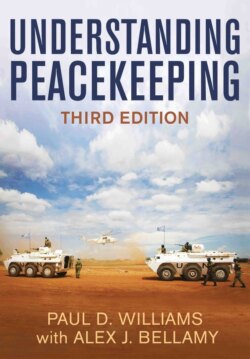Читать книгу Understanding Peacekeeping - Alex J. Bellamy - Страница 36
Box 2.1 ‘Uniting for peace’ in the UN General Assembly
ОглавлениеIf the Security Council, because of the lack of unanimity of the permanent members, fails to exercise its primary responsibility for the maintenance of international peace and security in any case where there appears to be a threat to the peace, breach of the peace, or act of aggression, the General Assembly shall consider the matter immediately with a view to making appropriate recommendations to Members for collective measures, including in the case of a breach of the peace or acts of aggression the use of armed force when necessary, to maintain or restore international peace and security. If not in session at the time the General Assembly may meet in emergency special session within twenty four hours of the request therefor. Such emergency special session may be called if requested by the Security Council on the vote of any seven members, or by a majority of the Members of the United Nations. (General Assembly Resolution 377 (V, A1), 3 November 1950)
The Security Council’s powers are set out in Chapters V–VIII and XII of the Charter, where it is given primary responsibility for the maintenance of peace and security (see Sievers and Daws 2014; von Einsiedel et al. 2016). Its resolutions are binding on all member states, who are in turn required to assist in their fulfilment should the Council instruct them to do so. The Security Council consists of fifteen member states (expanded in 1965 from the original eleven). There are five permanent members (China, France, the Russian Federation, the UK and the US), and ten members are elected by the General Assembly on a two-year rotational basis. Resolutions (except on procedural matters, where the veto is not applicable) require nine affirmative votes and the concurrence of the permanent members. Although the tendency of the P5 members to use their veto has decreased since the end of the Cold War, it continues. Between 2000 and 2019, forty-seven vetoes were cast in the Security Council (twenty-three by Russia, thirteen by the United States and eleven by China). On occasion, a veto has been used to terminate a peace operation. This happened when China vetoed the extension of UNPREDEP’s mandate in Macedonia in 1999 and when the US vetoed the extension of UNMIBH’s mandate in Bosnia in 2002. Importantly, a veto does not have to be cast to influence the shape of the Council’s activities. As the permanent representative of Jamaica explained, ‘the mere presence of the threat of the veto or its possible use more often than not determined the way the Council conduct[ed] its business’ (cited in Hulton 2004: 239).
In the post-Cold War era, the Council took a more proactive approach to addressing issues of international peace and security and engaging in dialogue with other relevant actors, both within and outside the UN system. Two examples are its increased use of fact-finding missions to parts of the world under discussion within the Council and engaging in substantive and regular dialogue with NGOs about issues of peace and security. The latter development started in 1992 under the so-called Arria formula, when the Venezuelan permanent representative to the UN, Diego Arria, invited fellow members of the Council to meet away from the Council’s chambers with independent experts on the Balkans.
